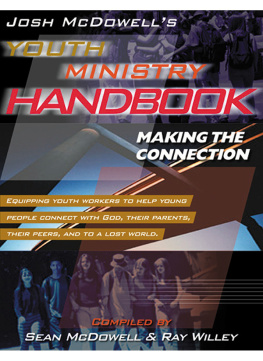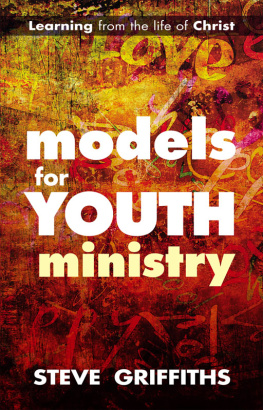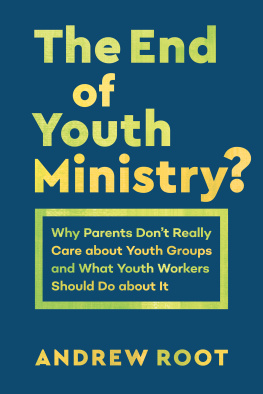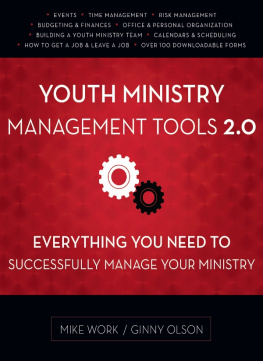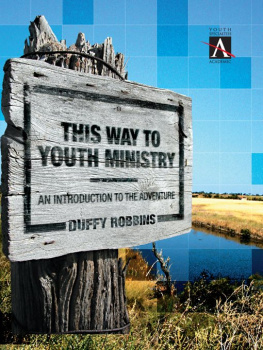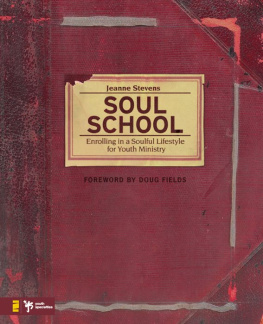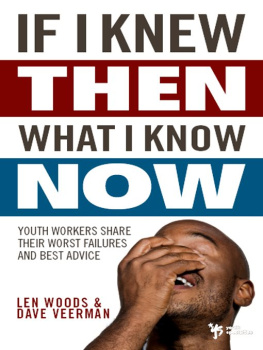Learn Before You Leap is a collection of one hundred one case studies designed to promote the growth and development of present and future youth workers. I believe that case studies are an underused tool that can allow youth workers to consider the kinds of real-life situations theyll face in their ministries. By allowing youth workers to think carefully about how they would respond to particular issues that arise in ministry and offering opportunities for them to discuss these situations with colleagues and mentors, this book will enable youth workers to leap more confidently into the situations they will encounter in their everyday work with youth.
In my own work as a teacher, Ive utilized case studies in preparing young youth workers at the university level for twelve years. Ive witnessed with my own eyes the increased engagement that students show when a case study is introduced. Ive seen profound growth among students who have opportunities to discuss these potential ministry challenges with peers as well as with ministry veterans who have journeyed through the ups and downs of living out their calling. I can also testify to the power of case studies in my own growth and development as a minister, a professor, and a Christian. Im convinced that one of the next logical steps in the maturing of the academic discipline of youth ministry is embracing the expanded use of case studies.
Since the 1980s Ive been actively involved in local expressions of the National Network of Youth Ministry. Ive been blessed beyond description by the fellowship, prayer, and relationships developed in those gatherings. As I look back, however, I wonder how much more I might have grown if our gatherings had included some intentional (yet informal) ongoing training with my fellow youth workers through case studies and conversation.
I believe todays developing youth workers need to wrestle with their own conclusions and convictions, rather than being spoon-fed pat answers. They want to be in relationships; they want to network; they want to discuss and brainstorm options with friends and mentors. They want a heads up about what theyll be facing in ministry so they can be prepared. They want to consider how they can apply what theyve learned in real-life ministry settings. Learn Before You Leap offers them opportunities to do all thatand much more!
WHY CASE STUDIES?
Clyde F. Herreid of the University of Buffalo calls case studies stories with a message. He continues, They are not simply narratives for entertainment. They are stories to educate. Humans are story-telling animals. Consequently, the use of cases gives a teacher an immediate advantage; he has the attention of the audience.
According to The Oxford English Dictionary, the term case study can be traced back to 1935, when the Harvard Business School began collecting real-life situations from business professionals. Those situations were then given to students who would think through possible strategies to address the opportunities and issues involved. In his 1948 book, On Understanding Science, chemist James Conant argued for the importance of using case studies in the natural and experimental sciences. Other fields of academic studyincluding the social sciences, law schools, and medicinesoon followed suit by including casework as part of their professional education. The use of case studies as a major focus in educating teachers was highlighted in a 1986 Carnegie report titled A Nation Prepared: Teachers for the 21st Century.
Organizations like The National Center for Case Study Teaching in Science at Buffalo University exist in order to promote the increased usage of case studies as either the core of entire courses or for single experiences in otherwise traditional lecture and lab courses. The Centers work over the past 15 years has found that students exposed to the case study method have been extraordinarily excited and actively involved in their learning.
British scientists Claire Davis and Elizabeth Wilcock have written Based on their own experience, they cite more than 30 benefits stemming from the use of case studies, many of which apply directly to our context as youth workers. Davis and Wilcock argue that case studies can
bridge the gap between theory and practice;
encourage active learning;
develop key skills of problem-solving and communication;
raise the level of critical thinking;
build partnership and collegiality;
prompt deeper diagnosis and meaning-making;
provide a vehicle for examining multiple points of view;
encourage attention to and self-consciousness about assumptions and conceptions;
enhance listening and cooperative skills;
help people monitor their own thinking and become aware of tension and ironies;
encompass an enormous range of possibilities; and
remind us that there may not always be one right answer after all!
When it comes to training for pastoral ministry, most seminaries and theological schools now make use of case studies as part of the field education portion of their curriculum. The American Association of Theological Schools has recognized the value of providing academically sound field education opportunities as part of the curriculum for future pastors. Case studies work hand-in-hand with field experience in allowing potential pastors to consider and reflect on the actual situations they will encounter in ministry. In their 1995 book Experiencing Ministry Supervision, William T. Pyle and Mary Alice Seals present case studies as their first suggestion for evaluating supervised ministry experience.
WHAT ABOUT YOUTH MINISTRY?
The field of youth ministry is already aware of the way case studies can be used to get students talking about real-life situations. In 1987, Jim Burns wrote The Youth Workers Book of Case Studies, a collection of 60 studies designed to get kids talking. Ten years later Burns and Mark Simone released an updated and expanded version of that book called Case Studies, Talk Sheets, and Discussion Starters. The introduction states, A case study goes deeper than an illustration by drawing us into the situation and asking us to face our own likely reactions even though we are not in reality involved. Learning occurs at a deeper level when we imagine how we would react or respond in a similar situation.
In 2004, Steve L. Case authored The Youth Workers Big Book of Case Studies, a collection of 180 case studies that promised to get students talking and add sizzle, spice, and even a bit of controversy to your next meeting.have done exactly what Case promises. But that raises a question: If we already know how effective case studies are in helping our students think through the real-life issues they are facing, why dont we make more intentional use of case studies in the training and continuing development of present and future youth workers?
As Ive mentioned, I believe case studies can be a valuable part of the formal training that youth workers receive in a college or seminary program. But I also feel discussion of case studies can be a valuable way youth workers can benefit and grow from the wisdom and insights of their ministry colleagues. Paul Fleishman has identified the importance of networking both formally and informally as one of the keys to making our youth ministries more effective. He notes that a key benefit of such networks is what he calls sharpening, building on Proverbs 27:17As iron sharpens iron, so one person sharpens another. Fleishman quotes one youth worker veteran of 18 years as saying, Why reinvent the wheel? If others are doing something successfully I want input from them. Another youth worker said he uses his network as a place to brainstorm ideas. Increased use of case studies makes the opportunities we have to network with other youth workers even more valuable.


